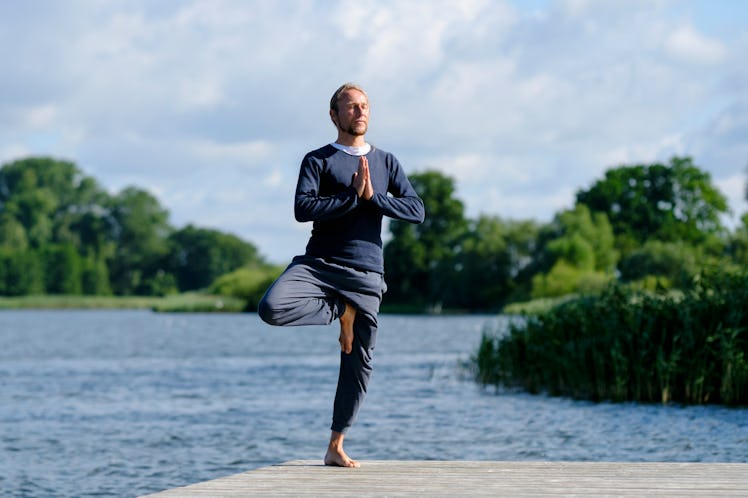If You Fail This 10-Second Balance Test, Your Risk Of Death Doubles
A new study found that people who couldn't pass this test had double the risk of dying within the next 10 years.

If you thought the TikTok viral “Old Man Test” was meaningless fun, surprise! New research finds that there’s a link between being unable to balance on one foot and an increased risk of, well, death. So you can find out a lot about your health and potential longevity by participating in a fitness challenge called the 10-second balance test.
Like all TikTok challenges, the “Old Man Test” is a fun time-waster that provides video fodder for the masses. It challenges participants to stand on one foot while putting on a sock and shoe on and then tying the shoe. Obvious hijinks ensue. But it’s not all fun and games. A team of international researchers has found that balancing on one foot, whether while putting on a sock or not, provides an insightful clue into how long a person may live.
For the study, published on June 22, the research team examined data from 1,702 people aged 51- to 75-years-olds, gathered from 2009 to 2020. They asked participants to stand on one foot while placing the front of their free foot on the back of their stationary leg, keeping their arms at their sides.
After three tries, one in five participants was unable to hold the position for 10 seconds. The likelihood of not maintaining balance increased with age — close to 5% among 51–55-year-olds; 8% among 56–60-year-olds; just under 18% among 61–65-year-olds; and almost 37% among 66–70-year-olds.
Of those who failed the test, 123 died over the next ten years, representing an 84% increased chance of death from any cause.
As dire as that may sound, failing the 10-second balance test is not a death sentence. And the presence of other health conditions such as heart disease, diabetes, and cancer were more prevalent in those who were unable to pass the test than in those who stood like a rock.
The study, though interesting, is observational in nature and doesn’t provide insight into causation, only correlation. So more research is needed to understand how or even if balance plays a role in longevity, or if it’s merely an indicator of overall fitness.
It’s worth noting that the majority of participants were affluent, white Brazilians, and 68% of participants were assigned male at birth. Additional research is needed to determine if these results are repeatable among various races, ethnicities, and socioeconomic demographics.
The research results do not necessarily mean that improving your balance will add years to your life, though any physical activity or exercise can improve your prospects. More accurately, the researchers point to the fact that those who live with chronic health problems are less likely to have strong core balance than those who don’t.
However, the study team does believe that the 10-second balance test provides “rapid and objective feedback for the patient and health professionals regarding static balance” and “adds useful information regarding mortality risk in middle-aged and older men and women.”
This article was originally published on